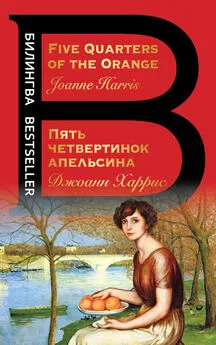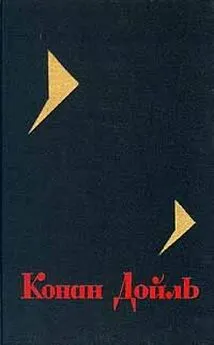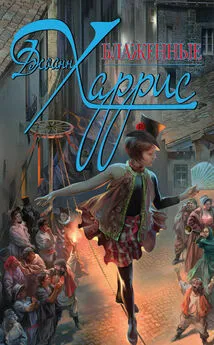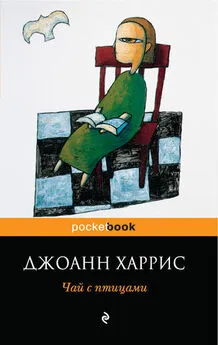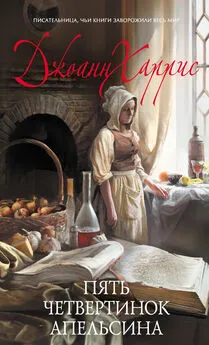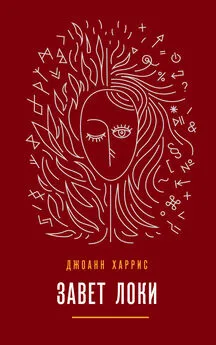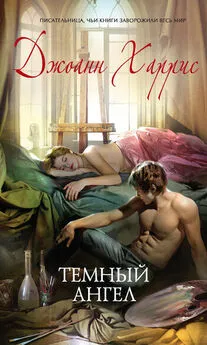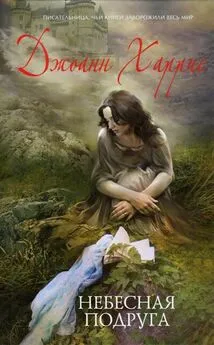Джоанн Харрис - Five Quarters of the Orange / Пять четвертинок апельсина
- Название:Five Quarters of the Orange / Пять четвертинок апельсина
- Автор:
- Жанр:
- Издательство:неизвестно
- Год:2022
- Город:Москва
- ISBN:978-5-04-163417-9
- Рейтинг:
- Избранное:Добавить в избранное
-
Отзывы:
-
Ваша оценка:
Джоанн Харрис - Five Quarters of the Orange / Пять четвертинок апельсина краткое содержание
Оригинальный текст и перевод на страницах одной книги – это эффективный способ усовершенствовать знание английского языка.
От матери в наследство Фрамбуаза получила альбом с кулинарными рецептами – негусто, если учесть, что ее брату Кассису досталась ферма, а старшей сестре Рен-Клод – винный погреб со всем содержимым. Но весь фокус в том, что на полях альбома, рядом с рецептами разных блюд и травяных снадобий, мать записывала свои мысли и признания относительно некоторых событий ее жизни – словом, вела своеобразный дневник. И в этом дневнике Фрамбуаза пытается найти ответы на мрачные загадки прошлого.
«Харрис создала многослойный сюжет, усыпанный восхитительными описаниями французских книг и раскрывающий встряхивающий эффект войны на хрупкое семейное устройство». – Publishers Weekly
«Из ее книг эта – пока самая сильная: острая, с горчинкой…» – Independent
В формате PDF A4 сохранен издательский макет.
Five Quarters of the Orange / Пять четвертинок апельсина - читать онлайн бесплатно ознакомительный отрывок
Интервал:
Закладка:
I tried to explain and found that I could not. Soldiers dying – even my own father – that was one thing. Even civilians killed in bombing, though there had been little enough of that in Les Laveuses. But this was different. My nightmares worsened. I spent hours watching the river with my fishing net, catching the evil brown snakes in the shallows, smashing their flat clever heads with a stone and nailing their bodies to the exposed roots at the riverbank. A week of this and there were twenty or more drooping lankly from the roots, and the stink – fishy and oddly sweet, like something bad fermented – was overwhelming. Cassis and Reinette were still at school – they both went to the collège in Angers – and it was Paul who found me with a clothespin on my nose to keep out the stench, doggedly stirring the muddy soup of the verge with my net.
He was wearing shorts and sandals, and held his dog, Malabar, on a leash made of string.
I gave him a look of indifference and turned back to the water. Paul sat down next to me. Malabar flopped onto the path, panting. I ignored them both. At last Paul spoke.
“Wh-what’s wrong?”
I shrugged. “Nothing. I’m just fishing, that’s all.”
Another silence.
“For’s-snakes.” His voice was carefully uninflected.
I nodded, rather defiantly.
“So?”
“So nothing.” He patted Malabar’s head. “You can do what you like.”
A pause that crawled between us like a racing snail.
“I wonder if it hurts,” I said at last.
He considered it for a moment as if he knew what I meant, then shook his head.
“Dunno.”
“They say the poison gets into your blood and makes you go numb. Just like going to sleep.”
He watched me noncommittally, neither agreeing nor disagreeing.
“C–Cassis sez that Jeannette Gaudin musta seen Old Mother,” he said at last. “You know. That’s why the snake b-bit her. Old Mother’s curse.”
I shook my head. Cassis, the avid storyteller and reader of lurid adventure magazines (with titles like The Mummy’s Curse or Barbarian Swarm), was always saying things like that.
“I don’t think Old Mother even exists,” I said defiantly. “I’ve never seen her, anyway. Besides, there’s no such thing as a curse. Everyone knows that.”
Paul looked at me with sad, indignant eyes.
“Course there is,” he said. “And she’s down there all right. M-my dad saw her once, way back before I was born. B-biggest pike you ever saw. Week later, he broke his leg falling off of his b-bike. Even your dad got-”
He broke off, dropping his eyes in sudden confusion.
“Not my dad,” I said sharply. “My dad was killed in battle.”
I had a sudden, vivid picture of him marching, a single link in an endless line that moved relentlessly toward a gaping horizon.
Paul shook his head.
“She’s there,” he said stubbornly. “Right at the deepest point of the Loire. Might be forty years old, maybe fifty. Pikes live a long time, the old uns. She’s black as the mud she lives in. And she’s clever, crazy-clever. She’d take a bird sitting on the water as easy as she’d gulp a piece of bread. My dad sez she’s not a pike at all but a ghost, a murderess, damned to watch the living forever. That’s why she hates us.”
This was a long speech for Paul, and in spite of myself I listened with interest. The river abounded with stories and old wives’ tales, but the story of Old Mother was the most enduring. The giant pike, her lip pierced and bristling with the hooks of anglers who had tried to catch her. In her eye, an evil intelligence. In her belly, a treasure of unknown origin and inestimable worth.
“My dad sez that if anyone was to catch her, she’d hafta give you a wish,” said Paul. “Sez he’d settle for a million francs and a look at that Greta Garbo’s underwear.”
He grinned sheepishly. That’s grownups for you, his smile seemed to say.
I considered this. I told myself I didn’t believe in curses or wishes for free. But the image of the old pike wouldn’t let go.
“If she’s there, we could catch her,” I told him abruptly. “It’s our river. We could.”
It was suddenly clear to me; not only possible, but an obligation. I thought of the dreams that had plagued me ever since Father died; dreams of drowning, of rolling blind in the black surf of the swollen Loire with the clammy feel of dead flesh all around me, of screaming and feeling my scream forced back into my throat, of drowning in myself. Somehow the pike personified all that, and though my thinking was certainly not as analytical as that, something in me was suddenly certain-certain-that if I were to catch Old Mother, something might happen. What it might be I would not articulate even to myself. But something, I thought in mounting, incomprehensible excitement. Something.
Paul looked at me in bewilderment.
“Catch her?” he repeated. “What for?”
“It’s our river,” I said stubbornly. “It shouldn’t be in our river.”
What I wanted to say was that the pike offended me in some secret, visceral way, much more so than the snakes: its slyness, its age, its evil complacency. But I could think of no way to say it. It was a monster.
“‘Sides, you’d never do it,” Paul went on. “I mean, people have tried. Grownup people. With lines and nets an’ all. It bites through the nets. And the lines… it breaks them right snap down the middle. It’s strong, see. Stronger than either of us.”
“Doesn’t have to be,” I insisted. “We could trap it.”
“You’d hafta be bloody clever to trap Old Mother,” said Paul stolidly.
“So?” I was beginning to be angry now, and I faced him with fists and face both clenched in frustration. “So we’ll be clever. Cassis and me and Reinette and you. All four of us. Unless you’re scared.”
“I’m not’s-scared, but it’s im-im-impossible.”
He was stuttering again, as he always did when he felt under pressure.
I looked at him.
“Well, I’ll do it on my own if you won’t help. And I’ll catch the old pike too. You just wait.”
For some reason my eyes were stinging. I wiped them furtively with the heel of my hand. I could see Paul watching me with a curious expression, but he said nothing. Viciously, I poked at the hot shallows with my net.
“‘S only an old fish,” I said. Poke. “I’ll get it and I’ll hang it on the Standing Stones.” Poke. “Right there.” I pointed at the Treasure Stone with my dripping net. “Right there,” I said again in a low voice, spitting on the ground to prove that what I said was true.
2
My mother smelt oranges all through that hot month. As often as once a week, though it was not every time that a bad spell ensued. While Cassis and Reinette were at school I ran to the river, mostly on my own but sometimes accompanied by Paul, when he could get away from his chores on the farm.
I had reached an awkward age, and separated from my siblings for most of those long days I grew bold and defiant, running away when my mother gave me work to do, missing meals and coming home late and dirty, my clothes streaked yellow with riverbank dust, hair untied and plastered back with sweat. I must have been born confrontational, but that summer I grew more so than I had ever been. My mother and I stalked each other like cats staking out their territory. Every touch was a spark that hissed with static. Every word was a potential insult, every conversation a minefield. At mealtimes we sat face-to-face, glowering over our soup and pancakes. Cassis and Reine flanked us like frightened courtiers, big-eyed and silent.
I don’t know why we pitted ourselves against each other; maybe it was the simple fact that I was growing up. The woman who had terrified me during my infancy now took on a different light. I could see the gray in her hair, the lines bracketing her mouth. I could see now – with a flash of contempt – that she was only an aging woman whose bad spells sent her helpless to her room.
And she baited me. Deliberately-or so I thought. Now I think that maybe she couldn’t help it, that it was as much in her unhappy nature to bait me as it was in mine to defy her. It seemed during that summer that every time she opened her mouth it was to criticize. My manners, my dress, my appearance, my opinions. Everything, according to her, was reprehensible. I was slovenly: I left my clothes unfolded at the foot of my bed when I went to sleep. I slouched when I walked: I would become a hunchback if I wasn’t careful. I was greedy, stuffing myself with fruit from the orchard. Otherwise I had little appetite: I was growing thin, scrawny. Why couldn’t I be more like Reine-Claude? At twelve, my sister had already ripened. Soft and sweet as dark honey, with amber eyes and autumn hair, she was every storybook heroine, every screen goddess I had ever imagined and admired. When we were younger she would let me plait her hair, and I would twist flowers and berries into the thick strands and circle her head with convolvulus so that she looked like a woodland sprite. Now there was something almost adult about her composure, her passive sweetness. Next to her I looked like a frog, my mother told me, an ugly skinny little frog with my wide sullen mouth and my big hands and feet.
I remember one of those dinnertime conflicts in particular. I remember we had paupiettes, those little parcels of veal and minced pork tied with string and cooked in a thick stew of carrots, shallots, tomatoes in white wine. I looked into my plate with sullen disinterest. Reinette and Cassis looked at nothing, carefully detached.
My mother clenched her fists, infuriated by my silence. After my father’s death there was no one to temper her rage, and it was always close by, boiling under the surface. She seldom struck us-very unusual in those days, almost a freak-though it was not, I suspect, from any great sense of affection. Rather, she was afraid that, having begun, she might not be able to stop.
“Don’t slouch, for God’s sake.” Her voice was tart as an unripe gooseberry. “You know that if you slouch, you’ll end up staying that way.”
I gave her a quick, insolent look and put my elbows on the table.
“Elbows off the table!” she almost moaned. “Look at your sister. Look at her. Does she slouch? Does she behave like a sulky farmhand?”
It did not occur to me to resent Reinette. It was my mother I resented, and I showed it with every movement of my sly young body. I gave her every excuse to hound me. She wanted the clothes on the washing line hung by the hems: I hung them by the collars. The jars in the pantry had to have the labels facing the front: I turned them backward. I forgot to wash my hands before meals. I changed the order of the pans hanging on the kitchen wall, largest to smallest. I left the kitchen window open so that when she opened the door the draft would make it bang. I infringed a thousand of her personal rules, and she reacted to each trespass with the same bewildered rage. To her, those petty rules mattered because those were the things she used to control our world. Take them away and she was like the rest of us, orphaned and lost.
Of course, I didn’t know that then.
“You’re a hard little bitch, aren’t you?” she said at last, pushing away her plate. “Hard as nails.” There was neither hostility nor affection in her voice, merely a kind of cool disinterest. “I used to be like that,” she said. It was the first time I had ever heard her speak of her own childhood. “At your age.”
Her smile was stretched and mirthless. Impossible to imagine her ever being young. I stabbed at my paupiette in its congealing sauce.
Читать дальшеИнтервал:
Закладка:
